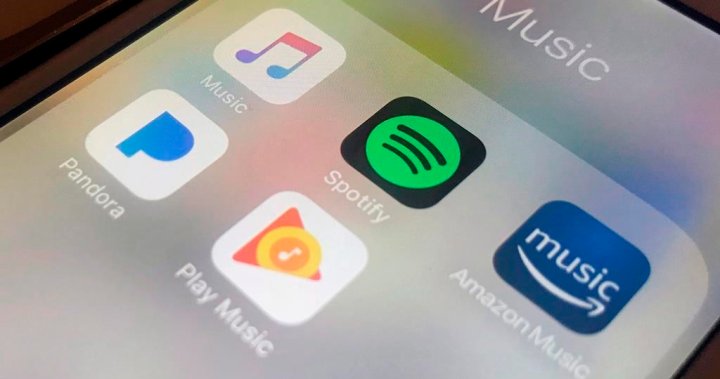Quebecers are increasingly streaming music online but listening less often to francophone artists, a trend members of the province’s music industry hope will be reversed with a new federal bill.
Around 30 per cent of physical albums sold in Quebec in 2022 were by Quebec artists, the province’s statistics institute said in mid-December 2022. But on streaming platforms such as Spotify, YouTube and Google Play Music, local artists accounted for less than eight per cent of plays.
Statistics like that worry David Bussières, a musician who sits on the board of Union des artistes, a labour organization that represents musicians and other performers.
A lot of the music people listen to online is recommended to them by algorithms, he said in an interview, adding that the algorithms serve global audiences and tend to recommend popular artists who perform in English rather in French.
Quebec’s cultural identity will be weakened if Quebecers are less aware than in years past of the province’s musicians, he said.
“The result of this is that the Quebec audience doesn’t get enough exposure to its music; they don’t know it well enough,” said Bussières, who is one-half of the electropop duo Alfa Rococo.
Read more:
Google ‘trying to intimidate Canadians’ over online streaming bill, heritage minister says
Read More
Bill C-11, currently before the Senate, would help increase Quebecers’ exposure to local francophone artists by requiring streaming platforms to promote local musicians, including francophone artists, he said.
Under the bill, foreign online streaming services would be forced to “reflect and support Canada’s linguistic duality by placing significant importance on the creation, production and broadcasting of original French language programs.”
Artists make money every time their songs are streamed online — though not much: one million plays on Spotify will generate $5,000 in revenue, Bussières said. But artists are also using streaming platforms to build audiences that will buy concert tickets, leading to bookings at large festivals.
If new artists aren’t able to build audiences, they’ll struggle to make a living as musicians, Bussières said.
“Eventually, it’s going to diminish the impact that music from here has on the public and our cultural identity is going to be weakened.”
In November, Quebec’s statistics agency said that only four of the top 50 most-listened-to artists in Quebec on streaming services were from the province. The number 1 Quebec artist was folk-rock group Les Cowboys fringants, in 16th place.
Eve Paré, the executive director of a Quebec music industry association, said Quebecers want to listen to local music, they’re just having a harder time finding it. Record stores used to display local music prominently, Paré, with Association québécoise de l’industrie du disque, du spectacle et de la vidéo, said in an interview.
When CDs were still the dominant way Quebecers consumed music, local artists accounted for around half of sales, she said.
Music consumers can’t search for what they don’t know about, so they rely on algorithms and curated playlists, she said. And streaming platforms, she added, don’t give Quebec artists enough prominence.
Paré, who also supports Bill C-11, said music plays an important role in Quebec culture.
“It’s a social connection, we all have memories associated with certain songs. I think of the songs from my teenage years, for example; the people of my generation share memories associated with those same songs. It’s part of a collective heritage.”
But critics of the bill, which would bring streaming services under the purview of the Canadian Radio-television and Telecommunications Commission, say it won’t necessarily help Quebec artists.
Nathan Wiszniak, head of artist and label partnerships at Spotify, told a Senate committee in September that his company’s platform allows users to discover artists that they would never hear on the radio.
“For example, seven out of the top 10 most streamed French-Canadian artists are independent rappers, and only two of those artists currently appear on French-Canadian radio charts,” he told the committee. Users, he said, need to retain “control of their listening experience.”
READ MORE: YouTube, TikTok say Liberals’ online streaming bill would harm digital creators
The bill, which has been passed by the House of Commons, has also faced criticism from content creators who worry they won’t meet Canadian content requirements, and from civil libertarians who reject increased government regulation of the internet.
Sara Bannerman, a communications professor at McMaster University, said it’s unclear how government regulators will use the new powers granted under the bill.
While members of Quebec’s music industry hope the law will force platforms to change their algorithms, she said that might not be the approach the CRTC takes. The regulator might rely on promotional campaigns to support Canadian content or could force streaming companies to make it easier to search for specific types of content.
Bannerman said the algorithms of streaming services should be made accessible to independent researchers and the CRTC. Recommendation algorithms aren’t neutral, she said, adding that they tend to be biased toward popular content and may also have racial and gender biases.
Bussières said increasing the prominence of Quebec artists on streaming sites is critical to a healthy Quebec music industry — and a strong culture.
“When we celebrate the Fête nationale, when we celebrate something, when we celebrate our culture, much more often than not, it’s through music.”





